How former Hong Kong court translator became China’s man in Washington at a crucial time
- Wu Tingfang helped end a war, put himself about in Washington and assisted the US in Boxer Rebellion. But he fell foul of the American press
When Wu Tingfang, the first English-speaking Chinese minister to the United States (serving 1897-1902), arrived in Washington, the stakes could not have been higher.
China's existence as a state was in play, and Wu's diplomacy and careful cultivation of a bilateral relationship with the US would play a key role in ensuring his country's survival.
A key element of Wu's background that enabled him to play such a pivotal role in US-China relations was the unconventional diplomat's combination of bicultural education and experience.
Do you have questions about the biggest topics and trends from around the world? Get the answers with SCMP Knowledge, our new platform of curated content with explainers, FAQs, analyses and infographics brought to you by our award-winning team.
Wu Tingfang was actually an official name, bestowed by the Chinese imperial government on Ng Choy, born in 1842 to a forward-thinking merchant in the Malacca Strait.
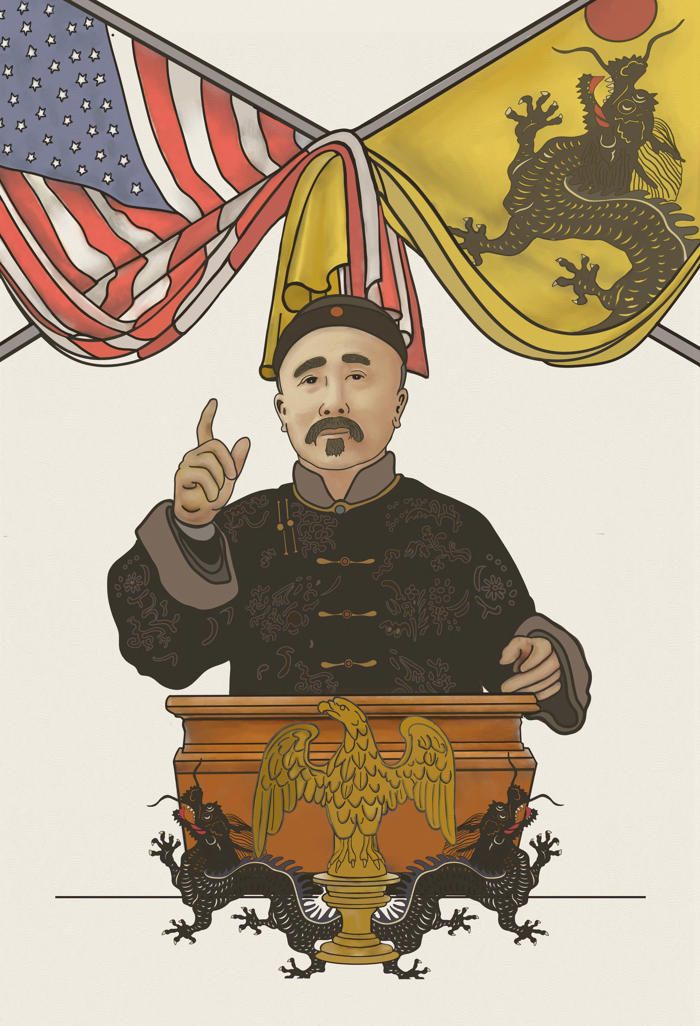
A depiction of Wu giving a speech on a podium framed by United States and Imperial Qing flags. Illustration: Samuel Porteous
As a boy, Ng received a blended education of "native" schooling in mainland China until he was 13, followed by the Christian middle school of St Paul's in Hong Kong.
Upon graduation, he dabbled in journalism for a few years then spent more than a decade as a translator in Hong Kong's colonial police courts, wading through the muck of East-West relations.
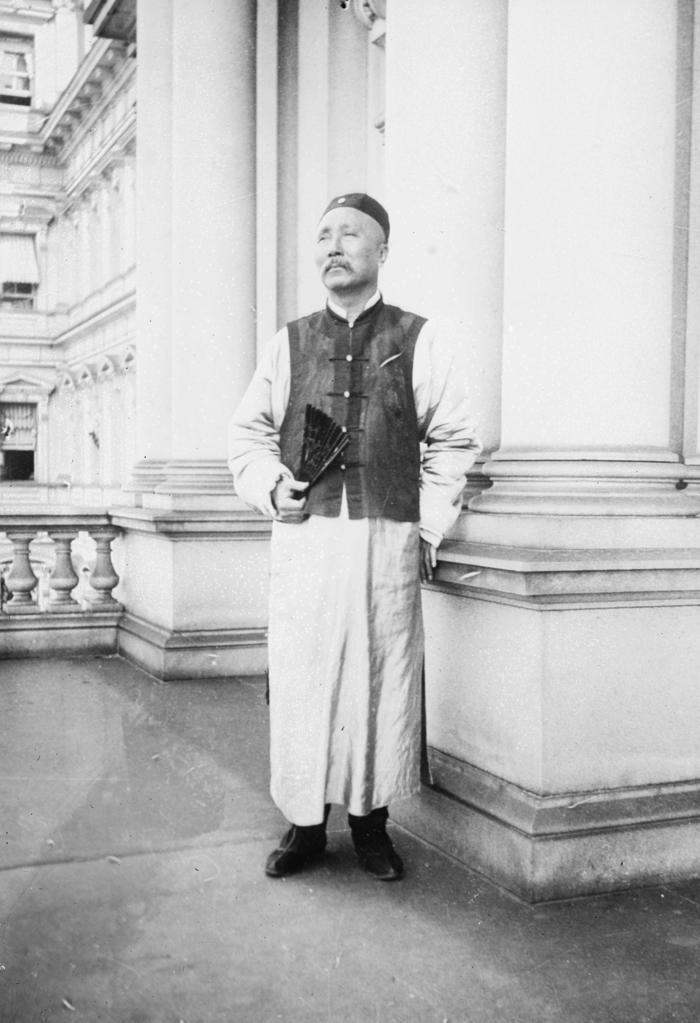
Wu in New York in 1920. Photo: Getty Images
The ambitious Ng followed this with a high-honours law degree at London's prestigious Lincoln's Inn.
Upon his return to Hong Kong in 1877, enjoying minor celebrity status as the first Chinese to become an English barrister, Ng's upwards path continued.
The 35-year-old set up a law practice in Hong Kong and fell increasingly under the patronage of "pro-native" Hong Kong governor John Pope Hennessy.
In 1880, Hennessy appointed Ng to a non-elected position on the Hong Kong legislative council, and not long after, named him the colony's first Chinese police magistrate.
Ng's performance in these duties did not meet with universal acclaim, however. Less progressive elements took to the Overland China Mail to bemoan the "mediocre ability" and "superlative bumptiousness" of their latest legislator.
Ng, who famously called upon his fellow Chinese to display more cheek in the British colony, could rub some the wrong way, and assessing his career options in 1882, he leapt at an opportunity to work for the Chinese imperial government in Tientsin (modern-day Tianjin).
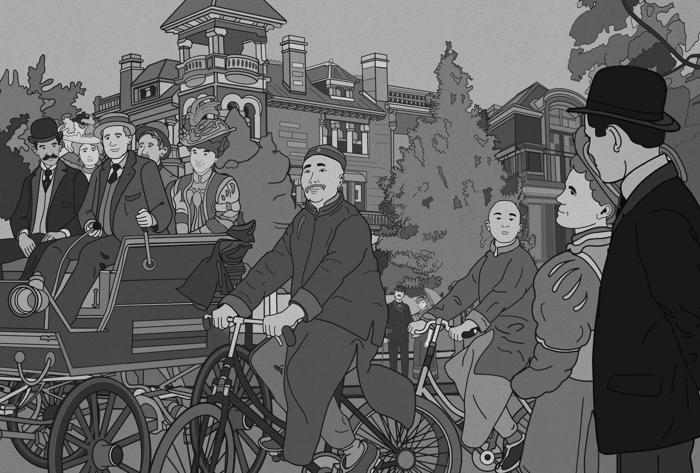
A depiction of Wu participating in the bicycle fad of the 1890s. Illustration: Samuel Porteous
The offer came from legendary foreign-relations mandarin and reformer Li Hongzhang, who was on the lookout for talented young Chinese adept in foreign languages and cultures.
He needed this new kind of China bureaucrat to serve as a counterpoint to the standard high-level civil servants who surrounded him.
These cloistered bureaucrats, with their deep study of the Chinese classics required by the 1,000-year-old government entrance exams, were ill-prepared to deal with a modern world dominated by Western powers.
As part of his entry into the loftier heights of the Chinese bureaucracy, Ng was bestowed his official name.
Wu was the Mandarin translation of Ng, and "Tingfang" roughly translated to "hall fragrance", all intended to convey, according to a report in the Washington Evening Star, one who "is so just and eminent a law giver that the sweet savour of his reputation 'fills the court'".
The new Wu proved a quick study. In his first five years he played a key supporting role in negotiating settlement of the disastrous first Sino-Japanese war (1894-95), served as a director of the newly created Tientsin University, and managed China's first commercial railway. Having thus earned Li's trust, Wu became the first foreign-educated Chinese to be placed in a major diplomatic position.
Arriving in the spring of 1897, the new Chinese minister to Washington hit the ground running.
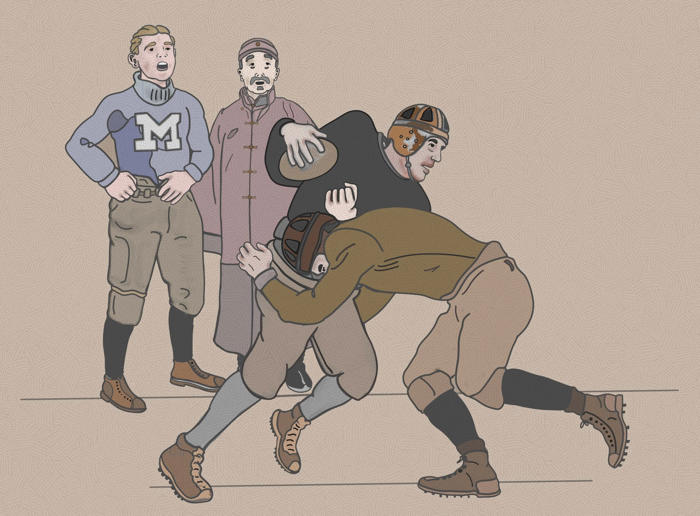
A depiction of Wu attending his first American football game, in 1901, at the University of Michigan, which he found to be a surprisingly violent spectacle. Illustration: Samuel Porteous
According to the Atlanta Constitution, Wu "astonished" those present with his mastery of English while presenting his credentials to President William McKinley. Moreover, Wu's open and social nature was in high contrast with his predecessors.
Within a few months the Chicago Tribune noted the always traditionally attired Wu was "fast becoming the best known and most popular diplomat in Washington".
Almost all key cabinet ministers came to dinners hosted by Wu and his wife, and stories of Wu's capacity - when challenged - to drink assorted legislators under the table and then, as the Baltimore Sun described it, go "in search of new senators to conquer" became legendary.
Apart from contributing to the diplomatic social whirl in Washington, Wu also delivered in geopolitics.
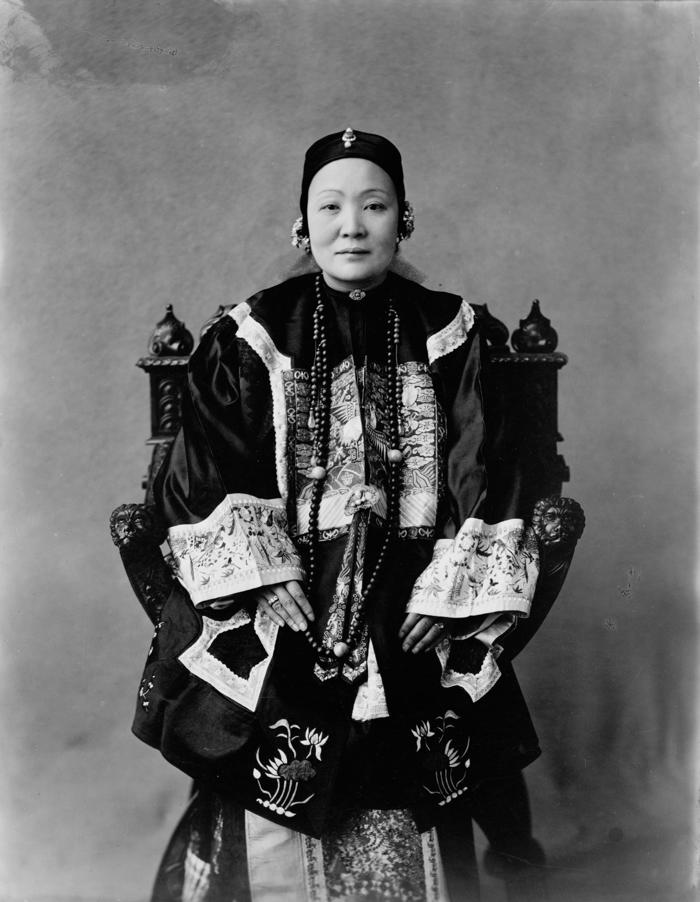
Madame Wu Tingfang accompanied her husband in the US, where the two hosted dinners and wooed key cabinet ministers. Photo: Getty Images
In 1898, at the onset of the Spanish-American War - America's first "Pacific pivot" - Wu assured the McKinley administration that the Chinese would maintain neutrality. This ensured Chinese ports remained open to the US Navy should they be needed during the conflict, by which an expansionist US acquired Guam and the Philippines.
Through these acts and others, Wu soon established strong personal and professional ties with the US secretary of state, John Hay, as well as McKinley.
Beyond Washington, as his first years in the US unfolded, newspapers and the general public also became enamoured of Wu. The Chinese minister maintained a dizzying schedule of postprandial talks at high-level private clubs and august educational institutions.
This was how one got one's message out in this era, and no one was better at it than Wu. As the Chicago Tribune noted, Wu, in his first years in Washington, pretty much "accepted invitations from just about anybody to go anywhere" and in so doing, endeared himself to everyone.
Wu was always up to something newsworthy. His insightful and entertaining pronouncements, be they on Confucianism and Christianity, women's hats, automobiles, or the revival of Chinese inventiveness, made their way into newspapers around the country - Wu was nothing if not good copy.
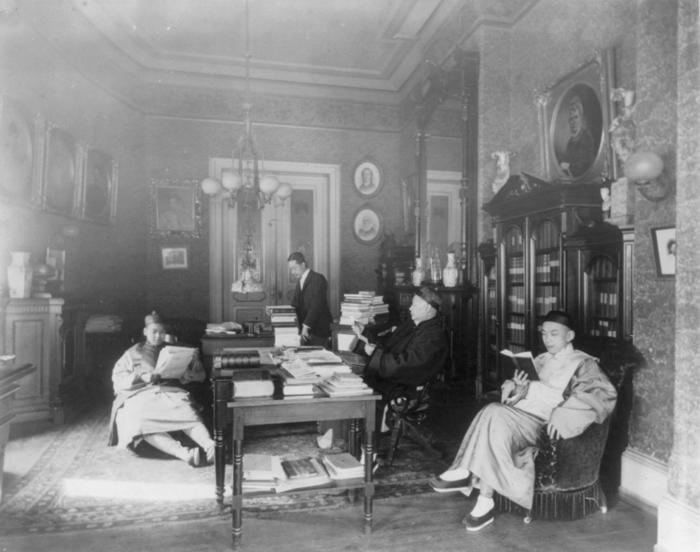
The Chinese legation in Washington. Photo: Getty Images
But it was not all fun and games. His speeches addressed the unfairness of the China Exclusion Act and the ill-regard that sometimes became violence that Chinese people often met in the US.
He dealt with highbinder Chinese gangs afflicting Chinese communities, and even irrational attempts by San Francisco public-health authorities to impose race-based vaccination and quarantine measures to address an outbreak of bubonic plague that did not exist.
Wu himself was not immune to hostility. During a trip to New York early in his tenure, he and his entourage were attacked - their carriage surrounded by a mob and pelted with stones and eggs.
The diplomat took these occasional public assaults, and even death threats, as part of the price of being a prominent public figure.
Wu, as well as anyone, understood the power that derived from fame and popularity in America and how to wield it. And this proved fortunate. Nearing his third year in the US, events were conspiring to ensure he would need all the goodwill his public diplomacy had generated.
Up to that point Wu had helped shape a US policy towards China reflective of what the Atlanta Constitution described as the young country's instinctual preference for "its capitalists to invade foreign countries, not its army".
Hay, who had been raised in an anti-slavery family and served as an aide to Abraham Lincoln, had already come out in late 1899 with a clear statement from the McKinley administration that despite entreaties from several European nations setting up cantonments and trading ports in China, the US "has no intention of acquiring a sphere of influence in China".
The American position was not solely motivated by its better angels. Its Open-Door policy assisting China maintain its territorial integrity also reflected US thinking that a China open for trade - as opposed to a China parcelled out among rival blocks - would be the best possible outcome for America's fast-emerging exporters and businessmen.
Then came the Boxers. Initially dismissed as a ragtag group of anti-Western peasants, superstitious idlers and disaffected members of the Chinese army, the movement soon built momentum.
A divided Chinese government waffled between condemnation and calling them patriots. By June 1900, "the Society of Righteous Fists" numbered in the tens of thousands, and was marching on Peking.
Lurid descriptions of the murders of Chinese Christians and foreigners filled the newspapers, and their attacks on Peking's foreign legations riveted readers around the globe.
On July 14 that year, front-page reports declared that foreign representatives in the isolated capital had been massacred, and the response from Western nations was visceral.
Calls arose for the foreign troops amassing in Tientsin to burn the port city, where much of the trouble was centred, to the ground. Influential journalist Ambrose Bierce, of the San Francisco Examiner, proposed "a righteous war" with China that would "set the whole country ablaze in enthusiasm".
Meanwhile, Wu, whose sources claimed legation staff were still alive, decried the inflammatory, unconfirmed reports and counselled calm.
These latest developments put the McKinley administration under enormous pressure to join European countries that saw the Boxer uprising as an opportunity to both punish China and partition it.
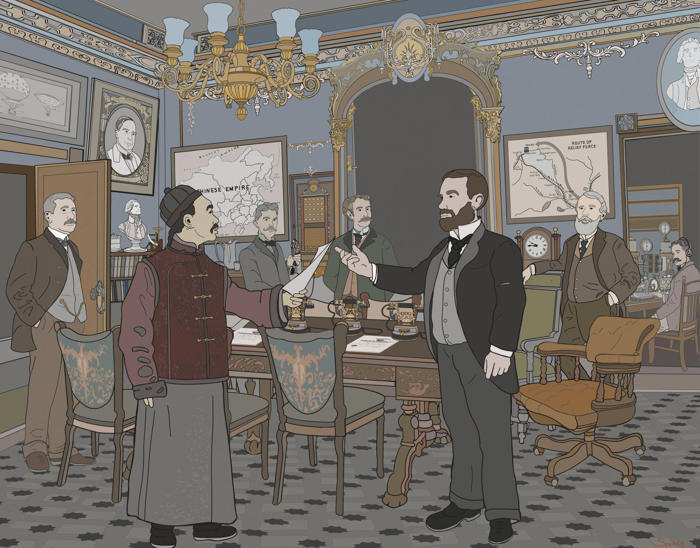
A depiction of the moment Wu delivered the historic Conger telegram to US Secretary of State Hay in July, 1900. Illustration: Samuel Porteous
According to Reuters, Hay entrusted to Wu a US State Department cipher message with instructions to "spare no efforts or expenses" in getting it to the US minister to Peking Edwin Conger - if he was still alive.
Wu tapped his network of select viceroys in southern China to undertake the mission, and after one week, involving much derring-do by Chinese messengers and additional false alarms, they succeeded.
On July 20, newspapers across the US reported the State Department had received, via Wu, an authentic encrypted message from a still very much alive Conger.
The news that Conger and the foreigners sheltering at the legations were alive was met with jubilation. Foreign troops were nearing Peking and authorities were sure time was on their side.
The Pittsburgh Press assessed Wu's "conduct during the trying times" to be "beyond all praise".
Speaking officially for the American government, Hay reiterated that the US was not at war with China, and added that the goal of foreign powers continuing to mass in Tientsin should be to help the legitimate Chinese forces restore order, not to punish or invade.
The Washington Post devoted several columns to Wu's "astounding power" - even in the face of "the horrors enacted in China" and "the passions and prejudices inflamed" - to appeal to the goodwill and admiration of Americans.
The Baltimore Sun, writing in December of 1900, described Wu as "the guiding force" in Hay's handling of the Boxer crisis.
With the uprising officially quelled in September 1901 and the threat of partition having receded, Wu, in his last two years as minister, rallied for one last great project: blocking the renewal of the Chinese Exclusion Act.
Initially, Wu made good progress.
The Baltimore American observed Wu, in his speeches, articles and relationships with legislators, was "revolutionising public opinion with regard to his country".
His core argument, that it was a strange thing to exclude a people because of their virtues such as intelligence, thriftiness and industry rather than their vices, struck home with many Americans.
But Wu soon discovered that wading into debates on domestic policies affecting jobs was an entirely different thing than advocating for far-off concepts such as preserving China's territorial integrity.
Wu's path would be further complicated by the assassination of McKinley by anarchist Leon Czolgosz in September 1901 and the subsequent elevation of the famously anti-corporate pioneer populist Theodore Roosevelt to the presidency.
In keeping with the country's new soured mood, in February 1902 the San Francisco Examiner - motto: "An American Paper for the American People" - linked Wu to a "conspiracy of businessmen to throw open the Golden Gate to the influx of the Mongol hordes".
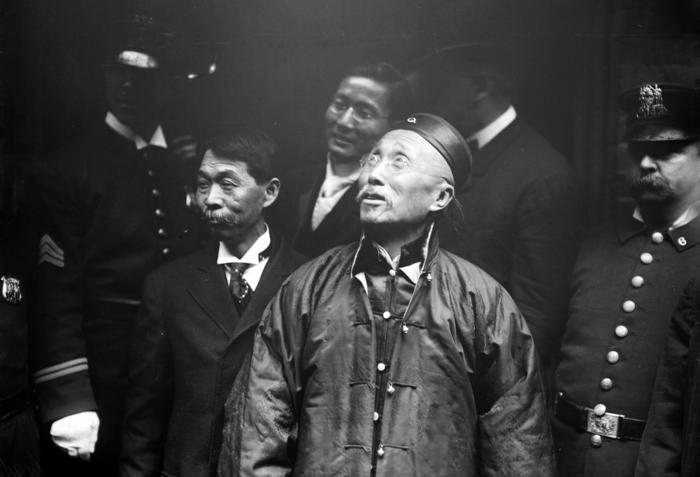
Wu circa 1922. Photo: Getty Images
On the Exclusion Act, the Convention of the American Federation of Labor denounced Wu in December 1901.
In April 1902, the Los Angeles Times reported Wu was "bitterly attacked in the Senate" during debates on the Chinese Exclusion Bill for "his unusual interference in American legislative affairs".
The Russell Record went so far as to describe Wu as a "public nuisance", adding that "not only the Chinese but this particular Chinese must go".
The San Francisco Examiner, conceding Wu's point, acknowledged that the Chinese were "kept out as much for their virtues as their vices" and openly endorsed a law to "exclude the people" with whom Americans "cannot compete".
The San Francisco Chronicle crowed that the "hypnotic influence of Minister Wu" had been overcome, and that the general mood was to re-enact an even more comprehensive Exclusion Act.
After working in the US for close to five years, well over the normally allotted three for Chinese diplomatic postings, Wu was recalled to Peking to play a key role in redrafting and modernising China's thousands-of-years-old penal code. He would rise to foreign minister and acting prime minister in the short-lived Chinese Republican government.
The man The Washington Post described as "a pretty good American" in that they saw in Wu what they most valued in themselves "energy, ability and a true democratic spirit" would die in 1922 at the age of 82.
More Articles from SCMP
Chinese companies ‘going global’ should learn from Japan’s mistakes, academic says
Hongkongers told to avoid 2 kinds of Japanese baby biscuits over contamination fears
7 revelations from the explosive House of Beckham biography: allegations range from David’s affairs and the couple’s media war, to Meghan Markle’s ‘posh’ envy and boob job advice from Anna Wintour
Alibaba to close data centres in Australia, India amid expansion in Southeast Asia, Mexico
This article originally appeared on the South China Morning Post (www.scmp.com), the leading news media reporting on China and Asia.
Copyright (c) 2024. South China Morning Post Publishers Ltd. All rights reserved.
